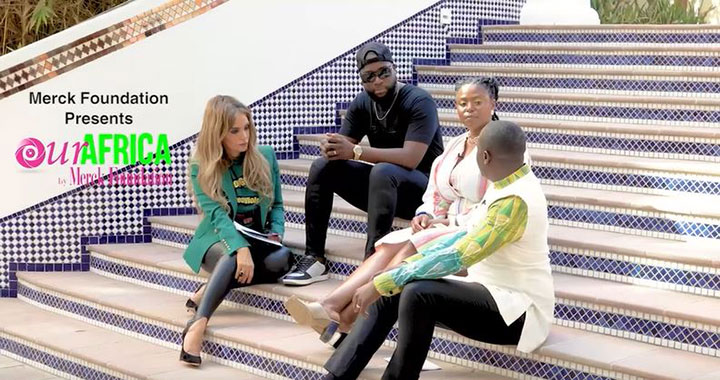

Fashion and Art can be used as powerful tools to address and raise awareness on pressing social and health issues in Africa and beyond, Merck Foundation CEO Senator Dr Rasha Kelej has said.
Speaking during the eighth episode of their TV programme ‘Our Africa by Merck Foundation’ last Saturday, Dr Kelej said fashion and art have a purpose beyond just entertainment and looking good.
“We must make the most out of these platforms to advocate for the causes we work towards every day. “Merck Foundation works closely with media and art communities across Africa to address and raise awareness on sensitive social and health issues such as diabetes, breaking infertility stigma, ending child marriage, stopping FGM, stopping GBV, supporting girl education and women’s empowerment and many more.
“Together, we can be the voice of the voiceless and bring about a positive change in our communities that will lead to a culture shift in Africa,” she said.
Dr Kelej also said young people have numerous untapped capabilities that if unleashed can empower and enable them to lead the sustainable development and green environmental agenda for their countries, encourage others to lead a sustainable lifestyle and adapt to the impact of climate change.
She also said their aim is to raise awareness about sustainability and environmental protection through their ‘Fashion and Art with Purpose’ community.
“I am happy to bring to you the eighth episode of ‘Our Africa by Merck Foundation’, with this episode we aim to raise awareness about sustainability and environmental protection through our ‘Fashion and Art with Purpose’ community. I am very happy that this episode was aired close to World Environment Day 2022 which is observed on 5th June every year,” she said.
Merck Foundation is the philanthropic arm of Merck KGaA Germany. The TV programme’s eighth episode addressed the important topic of “Sustainability is a Shared Responsibility”. Watch the Eighth Episode here: https://youtu.be/hFIHJ39Wd98
The episode featured Nana Kwabena Anoff, African Artist in Sustainable Art, who displayed his unique and remarkable art pieces made up of sustainable materials; Dr Sabrina Devi Ramamy Iranah, Director of Fashion and Design Institute, Mauritius and Jean Luc Emile, Managing Editor, Defimedia Group, Mauritius.
Young Fashion Designers from Mauritius – Desire Cedric Vincent and Deena Appaddo also featured showcased their recyclable fashion designs with messages on environmental sustainability during this episode.
Previous episodes have addressed diabetes prevention, breaking infertility stigma, supporting girl education, promoting a healthy lifestyle, ending female genital mutilation (FGM), and Coronavirus health awareness.
‘Our Africa by Merck Foundation’ is a pan African TV programme that is conceptualised, produced, directed, and co-hosted by Dr Kelej, to feature fashion designers, singers, and prominent guests from various domains with the aim to raise awareness and create a culture shift across Africa. The show is co-hosted by Brian Mulondo from Uganda.
“’Our Africa by Merck Foundation’ has been receiving an overwhelming response from our viewers who watch the show on TV. Our social media is also flooded with lovely messages from our followers across the globe.
All this attention is very valuable and inspiring to do more and to do better. I am certain the upcoming episodes will also be received well”, added Dr Kelej.
Globally, the textile and clothing sector is one of the largest segments of the economy, contributing almost $2.4 trillion to manufacturing and employing close to 300 million people across the world.
Fashion makes a sizeable contribution to climate change. The fashion industry accounts for about 8-10 percent of global carbon emissions, and nearly 20 percent of wastewater. This means that the fashion industry consumes more energy than both aviation and shipping combined.
Sustainable Fashion is a term for clothes that are created and consumed in a way that can be, quite literally, sustained, while protecting both the environment and those producing garments.
This is the reason cutting CO2 emissions, addressing overproduction, reducing pollution and waste, supporting biodiversity, and ensuring that garment workers are paid a fair wage and have safe working conditions, are all crucial to the scope of sustainability.
“Sustainable Fashion is a term that is increasingly used these days, as we all become aware of the serious environmental impact of our clothes. I feel so proud that the local fashion industry across Africa is exploring new sustainable solutions, and tapping into more traditional ones, that will enable them financially and protect the environment” added Dr Kelej.